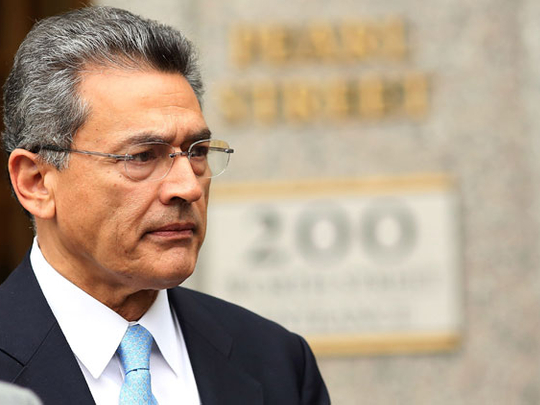
New York: Rajat K. Gupta, the former Goldman Sachs and Procter & Gamble director, was sentenced to two years in prison on Wednesday for leaking boardroom secrets to former hedge fund manager Raj Rajaratnam.
Gupta, 63, who ran the consulting firm McKinsey & Co. and served as a major adviser to the philanthropic efforts of Bill Gates and Bill Clinton, is the most prominent figure to face prison in the government’s sweeping crackdown on insider trading. He was also ordered to pay a $5 million fine.
“He is a good man,” Judge Jed S. Rakoff said of Gupta on Wednesday. “But the history of this country and the history of the world is full of examples of good men who did bad things.”
At Wednesday’s sentencing, Gupta appeared more haggard and strained than he did during his monthlong trial in May. After the sentence was issued, he sat expressionless, flanked by his lawyers. Just behind him, his wife, Anita, pinched her fingers tightly into her eyes, which were hidden behind dark sunglasses. His four grown daughters, who had attended their father’s trial nearly every day, were teary-eyed throughout the proceeding.
“The last 18 months have been the most challenging of my life since I lost my parents as a teenager,” Gupta, who was orphaned at 18, said in a statement to the court. “I regret terribly the impact on my family, friends and institutions that are dear to me.”
The Justice Department’s campaign to ferret out insider trading has reached onto the trading floors of some of Wall Street’s largest hedge funds and inside the most revered boardrooms of corporate America. Over a three-year stretch, more than 70 traders, bankers, lawyers and corporate executives have been convicted of insider trading crimes.
Rakoff of US District Court in Manhattan handed down a more lenient prison sentence for Gupta than the eight to 10 years stipulated by non-binding federal sentencing guidelines, citing the defendant’s aberrant behaviour in an otherwise laudatory life.
“The court can say without exaggeration that it has never encountered a defendant whose prior history suggests such an extraordinary devotion, not only to humanity writ large but also to individual human beings in their times of need,” Rakoff said.
A native of Kolkata, India, Gupta came to the United States to earn a graduate degree at Harvard Business School. He rose swiftly through the ranks of McKinsey and headed the firm for a decade.
He was a trusted adviser to captains of industry, including Henry R. Kravis of the private equity firm Kohlberg Kravis Roberts & Co. and Peter R. Dolan, the former chairman and chief executive of Bristol-Myers Squibb. A noted humanitarian, he has also played a leading role in organisations fighting diseases like Aids, malaria and tuberculosis in poverty-stricken nations.
After his retirement from McKinsey in 2007, Gupta joined numerous boards and became active on Wall Street. He grew close with Rajaratnam, the former head of the Galleon Group hedge fund. The two went into business together, starting a private equity firm. Gupta also invested in Galleon and used his gold-plated Rolodex to raise money for the fund.
It was during that stretch, in 2008, that the government wiretapped Rajaratnam’s cellphone and heard Gupta telling him boardroom gossip about Goldman Sachs. On other calls, Rajaratnam bragged to his Galleon colleagues about having a tipster inside Goldman.
The recordings turned the government’s focus on Gupta, who was arrested on insider trading charges in October 2011. He is one of 23 people criminally charged in a seven-year insider trading conspiracy orchestrated by Rajaratnam, who was convicted in 2011. Gupta also fought the accusations. A jury found Gupta guilty in May.
Federal prosecutors did not have any direct wiretap evidence of Gupta passing inside information about Goldman. Instead, the government’s case consisted of phone records, trading logs, instant messages and emails. In one example, the circumstantial evidence showed that Gupta participated in a Goldman board call during the financial crisis in which he learned that billionaire Warren Buffett would be making a $5 billion investment in the bank. After the call and before the public announcement of the investment, he quickly called Rajaratnam, who then bought Goldman shares.
“The proof of some of these tips was not only overwhelming; it was disgusting,” Rakoff said Wednesday. “A terrible breach of trust.”
The illegal tips about Goldman allowed Rajaratnam to gain about $5 million, according to the court. Gupta did not make any trades based on the information; he only passed it along.
“So why did Mr. Gupta do it?” Rakoff asked Wednesday, and then speculated on the reason. “Having finished his spectacular career at McKinsey in 2007, Gupta, for all his charitable endeavours, may have felt frustrated in not finding new business worlds to conquer; and Rajaratnam, a clever cultivator of persons with information, repeatedly held out prospects of exciting new international business opportunities that Rajaratnam would help fund but that Gupta would lead.”
Gupta’s sentence is far less than the 11 years and $92.8 million fine given to Rajaratnam, who is now in a federal prison in Ayer, Massachusetts. But it is in line with prison terms handed down by Rakoff in other recent insider trading cases.
The judge refused Gupta’s request to remain free while he appeals his case. Gupta, who lives in Westport, Connecticut, must surrender to federal prison authorities by January 8. The federal prison system does not have parole, but he can get a slight reduction in his sentence for good behaviour.
Rakoff agreed to a request from Gupta’s lawyers that he be assigned to a medium-security prison in Otisville, New York, although the Federal Bureau of Prisons makes that decision.
Throughout his legal travails, Gupta has been represented by Gary P. Naftalis and his colleagues at Kramer Levin Naftalis & Frankel. For his appeal, Gupta has retained Seth P. Waxman, a former US solicitor general who has argued more than 50 cases before the US Supreme Court.
On Wednesday, Naftalis tried to keep his client out of prison by arguing, unsuccessfully, that Gupta was a proud man for whom the loss of his reputation was a punishment far worse than incarceration.
“This is a fall from grace of Greek tragedy proportions,” Naftalis said.












